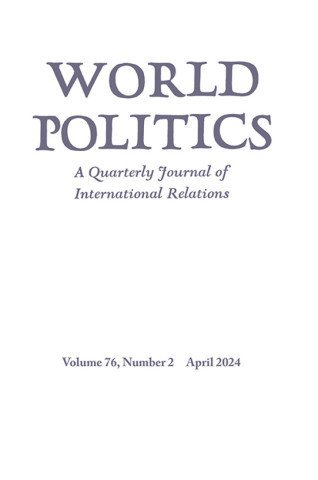Monopoly Politics: Price Competition, Learning, and the Evolution of Policy Regimes
IF 2.5
1区 社会学
Q1 INTERNATIONAL RELATIONS
引用次数: 1
Abstract
abstract:In the long run, economic policy in advanced industrial states has historically alternated between favoring price competition and favoring the market power of domestic firms, across such disparate areas as antitrust, intellectual property, and trade. This article presents a theory of long-term policy change, based on the interaction of accumulating economic costs and staff turnover within the state, explaining multiple policy alternations during the twentieth century. Policy regimes of competition or market power endogenously generate diminishing returns, manifested as unintended economic costs intrinsic to competition or market power. And yet policy regimes endure because established cadres of government officials remain committed to existing policy approaches. Even as diminishing returns become apparent, it is only after the removal or circumvention of these established policymakers, through staff turnover and learning by uncommitted officials, that policy eventually changes course. The article supports this argument with extensive evidence from government archives in the United States and France.垄断政治:价格竞争、学习和政策制度的演变
从长期来看,发达工业国家的经济政策历来在支持价格竞争和支持国内企业的市场力量之间交替,涉及反垄断、知识产权和贸易等不同领域。本文提出了一个长期政策变化的理论,该理论基于国家内部累积的经济成本和人员流动的相互作用,解释了20世纪的多次政策变化。竞争或市场力量的政策制度内生地产生递减的收益,表现为竞争或市场力量固有的意外经济成本。然而,政策制度之所以能够持续下去,是因为政府官员的现有骨干仍然致力于现有的政策方法。即使收益递减变得很明显,但只有在通过人员更替和不负责的官员学习,取消或规避这些既定政策制定者之后,政策才能最终改变方向。这篇文章用来自美国和法国政府档案的大量证据来支持这一论点。
本文章由计算机程序翻译,如有差异,请以英文原文为准。
求助全文
约1分钟内获得全文
求助全文
来源期刊

World Politics
Multiple-
CiteScore
8.40
自引率
0.00%
发文量
24
期刊介绍:
World Politics, founded in 1948, is an internationally renowned quarterly journal of political science published in both print and online versions. Open to contributions by scholars, World Politics invites submission of research articles that make theoretical and empirical contributions to the literature, review articles, and research notes bearing on problems in international relations and comparative politics. The journal does not publish articles on current affairs, policy pieces, or narratives of a journalistic nature. Articles submitted for consideration are unsolicited, except for review articles, which are usually commissioned. Published for the Princeton Institute for International and Regional Affairs
 求助内容:
求助内容: 应助结果提醒方式:
应助结果提醒方式:


